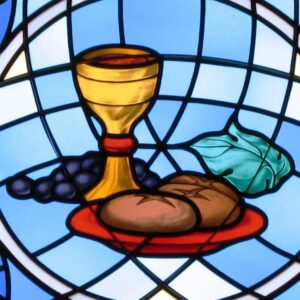 Last Sunday, as we heard at Mass, we switched from reading St. Mark’s Gospel to that of St. John. The Church offers us (in “St. Mark’s year”) a five-week stretch where we will share St. John’s sixth chapter. Today we continue with that 6th chapter, which shows Jesus as the “Bread of Life.”
Last Sunday, as we heard at Mass, we switched from reading St. Mark’s Gospel to that of St. John. The Church offers us (in “St. Mark’s year”) a five-week stretch where we will share St. John’s sixth chapter. Today we continue with that 6th chapter, which shows Jesus as the “Bread of Life.”
In last Sunday’s Gospel, we saw how excited the people were after Jesus had miraculously fed them with just a few loaves and fish. They were so excited that they wanted to make Him king. “This really is the prophet who is to come into the world,” they cried. Being fed with bread reminded them of Moses, who fed the people with manna (described in today’s first reading).
The miracle (or “sign”) in the beginning of John 6, was seen also as an expression of the expected coming of the Messiah. But Jesus fled to the mountains; He was, indeed, their Messiah but not in the way they expected. He wasn’t just a “wonder worker” and He certainly wasn’t a magician who could conjure up a supply of bread. They did not realize that the miraculous feeding itself was a spectacular sign pointing to something much deeper than the material bread they enjoyed. It was a sign of an altogether different kind of food, a different kind of nourishment on an entirely different level.
St. John’s sixth chapter is perhaps the most important moment in the life of the early Church, in Jesus’ public life, and in our lives because we witness Him offering here a food that nourishes us unlike any other, endures forever, and is “the real food” that He gives us: the Eucharist, His own Body and Blood.
***
As we prepare to gather for Mass this weekend, let’s ponder how often (and in how many ways) the Lord feeds and nourishes us:
Through every loving and nourishing experience which comes to us through people, books, the world of nature – in short, through everything which enriches and gives more meaning and understanding to our lives.
Through the Church – through the fellowship and mutual support we get through our involvement and participation in Christ’s Body, especially in our parish community.
Through the Scriptures – which feed our minds and hearts, and enrich and give meaning and direction to our lives.
Through the Eucharist, clearly, the sign by which we celebrate God’s love: shown to us through the life, suffering, death, and resurrection of Jesus Christ. John 6 makes a compelling argument that it is in and through the Eucharist that we give thanks for all the nourishing ways by which God, through Jesus, comes into our daily lives.
Grateful for all of this, of course, let’s not forget that the Eucharist is not a passive endeavor! As we are being fed and nourished by “the Bread come down from heaven,” we are called to show, by the way we live our lives, that Christ is really present in our hearts. We are called as well to share that which we have received with others – who are still hungry for life and meaning. It remains true that the Mass never really ends, but it must be lived. That is why, after singing the final hymn, we go in peace to love and serve the Lord.

